普通高中化学课程标准课程的基本理念(The basic idea of chemistry curriculum standard course in Senior
普通高中化学课程标准理解

普通高中化学课程标准理解教育部制定的《普通高中化学课程标准(2017年版)》于2018年1月出版。
新课标进一步强化了学科的育人功能,体现了鲜明的育人导向,思想性、科学性、时代性、整体性等明显增强。
一、课程性质与基本理念新课标对于“化学”的定义上,补充了它的特征,即从微观层次认识物质,以符号的形式描述物质,在不同层面创造物质。
对于“高中化学课程”的定义,进一步补充了它的地位作用,即落实立德树人根本任务、发展素质教育、弘扬科学精神、提升学生核心素养的重要载体,同时提出了化学学科的“核心素养”,并强调了它具有重要的地位和作用。
基本理念将原有的八条整合更新为五条,并为每一条进行了命名。
将原有“化学实验为主的多种探究活动”“体现化学学科的人文内涵”“引导教师反思”等删除;将原有“学习化学的基本原理和方法”“引导学生关注人类社会面临的社会问题”整合为“选择体现基础性和时代性的化学课程内容”;将原有的“评价方式”进行优化,变为“倡导基于化学学科核心素养的评价”;新增“重视开展‘素养为本’的教学”的基本理念。
二、学科核心素养为更好的体现化学学科育人的价值,适应高中学生发展核心素养的要求,2017版普通高中化学课程标准在目标部分做了较大的修改,新增学科核心素养。
化学学科核心素养包括“宏观辨识与微观探析”“变化观念与平衡思想”“证据推理与模型认知”“科学探究与创新意识”“科学态度与社会责任”。
化学学科核心素养不仅通过内涵、目标来描述,而且对5个方面的素养进一步划分出4级水平。
在课程目标的设定上,不再细分三维教学目标,而是根据化学学科核心素养对高中学生发展的具体要求,提出高中化学的课程目标。
将原三维目标(认知性目标、技能性目标及体验性目标)的行为动词描述做了调整,对新的课程目标统一划分出4级水平(从水平1到水平4),不再细究行为动词在三个维度的不同表述,而是更加具体的展示出了4级水平的具体内容。
三、课程结构与内容普通高中化学课程由必修、选择性必修和选修课程构成。
普通高中化学课程标准
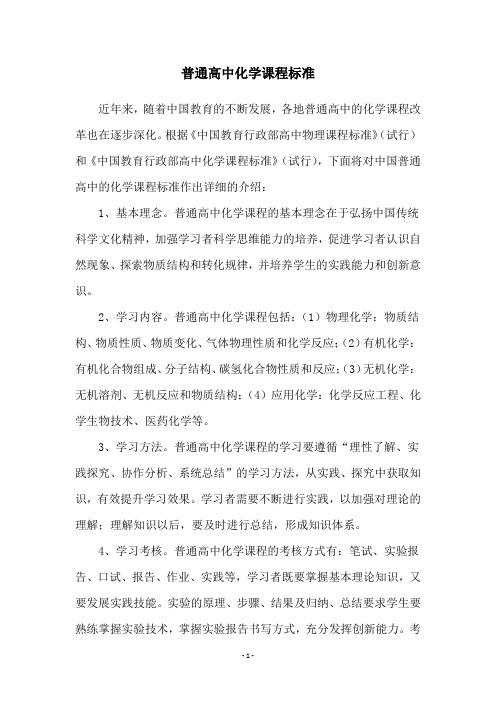
普通高中化学课程标准
近年来,随着中国教育的不断发展,各地普通高中的化学课程改革也在逐步深化。
根据《中国教育行政部高中物理课程标准》(试行)和《中国教育行政部高中化学课程标准》(试行),下面将对中国普通高中的化学课程标准作出详细的介绍:
1、基本理念。
普通高中化学课程的基本理念在于弘扬中国传统科学文化精神,加强学习者科学思维能力的培养,促进学习者认识自然现象、探索物质结构和转化规律,并培养学生的实践能力和创新意识。
2、学习内容。
普通高中化学课程包括:(1)物理化学:物质结构、物质性质、物质变化、气体物理性质和化学反应;(2)有机化学:有机化合物组成、分子结构、碳氢化合物性质和反应;(3)无机化学:无机溶剂、无机反应和物质结构;(4)应用化学:化学反应工程、化学生物技术、医药化学等。
3、学习方法。
普通高中化学课程的学习要遵循“理性了解、实践探究、协作分析、系统总结”的学习方法,从实践、探究中获取知识,有效提升学习效果。
学习者需要不断进行实践,以加强对理论的理解;理解知识以后,要及时进行总结,形成知识体系。
4、学习考核。
普通高中化学课程的考核方式有:笔试、实验报告、口试、报告、作业、实践等,学习者既要掌握基本理论知识,又要发展实践技能。
实验的原理、步骤、结果及归纳、总结要求学生要熟练掌握实验技术,掌握实验报告书写方式,充分发挥创新能力。
考
核也要考察学生参加化学竞赛和科技活动的表现。
以上便是普通高中化学课程的基本内容和要求,贯彻执行这些标准,可以使学生更好地掌握化学知识,并培养更强的创新精神,学以致用,成为未来社会的优秀人才。
普通高中化学课程的基本理念

普通高中化学课程的基本理念嘿,咱聊聊普通高中化学课程的基本理念呗!这可太重要啦!普通高中化学课程,那可不是一般的课程。
它就像一把神奇的钥匙,能打开科学世界的大门。
你想想,要是没有化学课,咱能知道那些奇妙的化学反应吗?肯定不能啊!化学课程的第一个基本理念,就是要培养咱的科学素养。
啥是科学素养呢?简单来说,就是让咱学会用科学的方法去思考问题,去解决问题。
这就好比给咱一把宝剑,让咱在知识的海洋里披荆斩棘。
你说,有了科学素养,咱是不是能变得更厉害?那当然啦!化学课上,咱会做各种实验。
这些实验可好玩啦!就像一场场神奇的魔术表演。
咱可以看到各种颜色的变化,听到各种奇妙的声音,感受到化学的魅力。
通过实验,咱能更直观地理解化学知识,这可比死记硬背强多啦!你说,做实验是不是很有趣?那还用说!还有啊,化学课程还注重培养咱的创新精神。
创新是啥?就是要敢于想别人不敢想的,做别人不敢做的。
这就像在黑暗中探索一条新路,虽然有点冒险,但一旦成功,那可就不得了啦!在化学课上,老师会鼓励咱提出自己的想法,尝试新的方法。
说不定咱就能发现一些新的化学反应,或者发明一些新的化学产品呢!你说,创新精神是不是很重要?那绝对是啊!化学课程也强调理论联系实际。
咱学的化学知识可不是纸上谈兵哦!它可以应用到我们的生活中。
比如说,咱可以用化学知识来解释为什么铁会生锈,为什么食物会变质。
咱还可以用化学知识来解决一些实际问题,比如如何保护环境,如何节约能源。
这就像把学到的武功用到江湖中去,多有成就感啊!你说,理论联系实际是不是很有意义?那肯定有意义啊!最后,化学课程还注重培养咱的合作精神。
在化学课上,咱经常会分组做实验,一起讨论问题。
这就像一个团队在战斗,大家各显神通,共同完成任务。
通过合作,咱能学会倾听别人的意见,学会与人沟通,学会互相帮助。
你说,合作精神是不是很宝贵?那当然宝贵啦!总之,普通高中化学课程的基本理念非常重要。
它能让咱在化学的世界里快乐地学习,成长为有科学素养、创新精神、理论联系实际能力和合作精神的人。
解读——2017年版《普通高中课程标准》化学解读

2003年的《普通高中化学课程标准(实验)》的前言部分,对化学学科的含义、特点与作用进行了明确的描述,准确定位了化学课程标准,明确了化学学科在高中教育中的地位和作用,有利于调动化学教师的教学积极性。
2017年版《普通高中化学课程标准》的前言部分肯定了03版的作用和贡献,同时提出面对新时代社会的变化和要求以及我国高中阶段教育基本普及的新形势,普通高中课程方案和课程标准实验稿还有一些不相适应和亟待修订改进之处。
2017年版《普通高中化学课程标准》前言部分主要是对两个方面进行了阐述。
一、修订工作的指导思想和基本原则2.基本原则(1)坚持正确的政治方向。
(2)坚持反映时代要求。
(3)坚持科学论证。
(4)坚持继承发展。
二、修订的主要内容和变化1.普通高中课程方案主要变化■进一步明确了普通高中教育的定位针对长期以来存在的片面追求升学率的倾向,强调普通高中教育是在义务教育基础上进一步提高国民素质、面向大众的基础教育,不只是为升大学做准备,还要为学生适应社会生活和职业发展做准备,为学生的终身发展奠定基础。
普通高中培养目标是进一步提升学生的综合素质,着力发展核心素养,使学生具有理想信念和社会责任感,具有科学文化素养和终身学习能力,具有创新精神和实践能力,具有自主发展能力和沟通合作能力。
■进一步优化了课程结构一是保留原有学习科目,在英语、日语、俄语基础上,增加德语、法语和西班牙语。
二是将课程类别调整为必修课程、选择性必修课程和选修课程。
在保证共同基础的前提下,为不同发展方向的学生提供有选择的课程。
三是进一步明确各类课程的功能定位,与高考综合改革相衔接:必修课程根据学生全面发展需要设置,全修全考;选择性必修课程根据学生个性发展和升学考试需要设置,选修选考;选修课程由学校根据实际情况统筹规划开设,学生自主选择修习,可以学而不考或学而备考,为学生就业和高校自主招生录取提供参考。
四是合理确定各类课程学分比例,在毕业总学分不变的情况下,对原必修课程学分进行重构,由必修课程学分、选择性必修课程学分组成,适当增加选修课程学分,既保证基础性,又兼顾选择性。
普通高中化学课程标准理念解读

普通高中化学课程标准理念解读关键词:新课程标准化学课程标准课程理论摘要:本文从课程改革与化学课程改革的关系出发,用国际比较、历史分析等方法,研究了普通高中化学课程改革的趋势分析了现在颁布的新课程标准的现实意义,从课程观、学生观、质量观、评价观诸方面,系统地解读了普通高中化学课程标准的理念。
关键词新课程标准化学课程标准课程理论一、课程改革的国际背景以及我国新一轮课程改革的重点1、课程改革的国际背景20世纪末世界各国纷纷开展面向21世纪的课程改革,不仅美国、英国、法国、日本等发达国家,印度、泰国、埃及等一些发展中国家也积极地投身于这场关乎民族命运的革命中。
这次改革有其深刻的国际背景,本文搜集了20世纪末各类刊物中出现频率较大的几个词语,来描绘这场变革的历史背景:经济全球化、知识经济、可持续发展、信息时代,它们代表了这个时代社会、经济、文化发展的主流,作为经济、科技、文化的基础——教育的变革也体现出与这种潮流发展相适应的特征。
综合各国改革的趋势,主要体现出以下几个方面的特征:⑴关注学生的终身发展;⑵关注学生的国际理解和文化多元;⑶强调综合实践能力;⑷加强课程与社会、生活发展的联系;⑸倡导学习方式的多元化[1];⑹通过课程改革,建立自主更新的课程模式,创造良好的学校文化。
2、我国课程的现状及新一轮课程改革的重点从解放初到20世纪未,我国进行了一系列的教育改革,每一次改革都取得了较大的成绩,客观上促进了当时社会的发展。
特别是第七次课程改革,是一次全面推行素质教育的改革,从教学观念上、教材上都进行了较大的更新,体现了时代对教育的需求。
但是,由于客观、主观原因,我国的基础教育课程还存在着许多的问题,如:课程标准“单一化”、“工具化”;内容“繁、难、偏、旧”;学习方式单一,以“传授式”为主;课程体制僵化,地方、学校对课程权力太小等。
1996年开始,我国开始酝酿21世纪的课程改革,在进行了大量的历史研究、国际比较后,提出了新一轮课程改革的几个重点:⑴转变课程的功能;⑵优化课程的结构;⑶更新课程的内容;⑷变革学习方式;⑸改革评价理念和方式;⑹深化课程管理体制的改革。
【新课标】2020年最新《普通高中化学学课程标准》(Word版共114页)
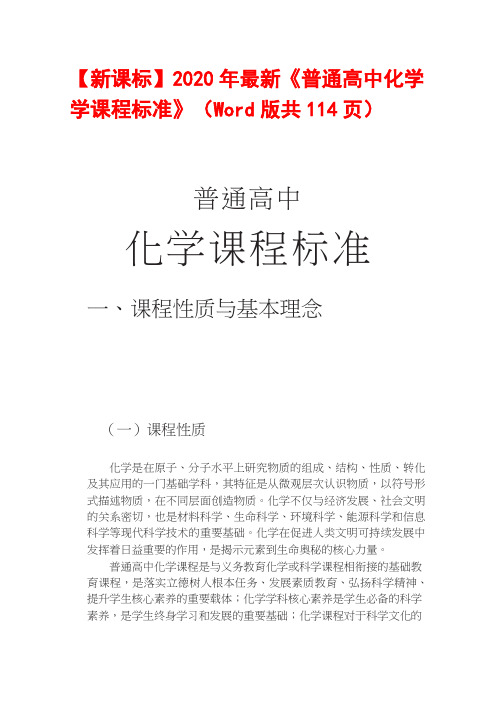
认识科学探究是进行科学解释和发现、创造和应用的科学实践活 动;能发现和提出有探究价值的问题;能从问题和假设出发,依据探究目的,设计探究方案,运用化学实验、调查等方法进行实验探究; 勤于实践,善于合作,敢于质疑,勇于创新。
素养5科学态度与社会责任
具有安全意识和严谨求实的科学态度,具有探索未知、崇尚真理 的意识;深刻认识化学对创造更多物质财富和精神财富、满足人民日 益增长的美好生活需要的重大贡献;具有节约资源、保护环境的可持 续发展意识,从自身做起,形成简约适度、绿色低碳的生活方式;能 对与化学有关的社会热点问题作出正确的价值判断,能参与有关化学 问题的社会实践活动。
3.选择体现基础性和时代性的化学课程内容
结合人类探索物质及其变化的历史与化学科学发展的趋势,引导学生进一步学习化学的基本原理和方法,形成化学学科的核心观念; 结合学生已有的经验和将要经历的社会生活实际,引导学生关注人类 面临的与化学有关的社会问题,培养学生的社会责任感、参与意识和 决策能力。
4.重视开展“素养为本”的教学
素养2变化观念与平衡思想
能认识物质是运动和变化的,知道化学变化需要一定的条件,并 遵循一定规律;认识化学变化的本质特征是有新物质生成,并伴有能量转化;认识化学变化有一定限度、速率,是可以调控的。能多角度、动态地分析化学变化,运用化学反应原理解决简单的实际问题。
素养3证据推理与模型认知
具有证据意识,能基于证据对物质组成、结构及其变化提出可能 的假设,通过分析推理加以证实或证伪;建立观点、结论和证据之间 的逻辑关系。知道可以通过分析、推理等方法认识研究对象的本质特 征、构成要素及其相互关系,建立认知模型,并能运用模型解释化学 现象,揭示现象的本质和规律。
3.初步学会收集各种证据,对物质的性质及其变化提出可能的
普通高中化学课程标准
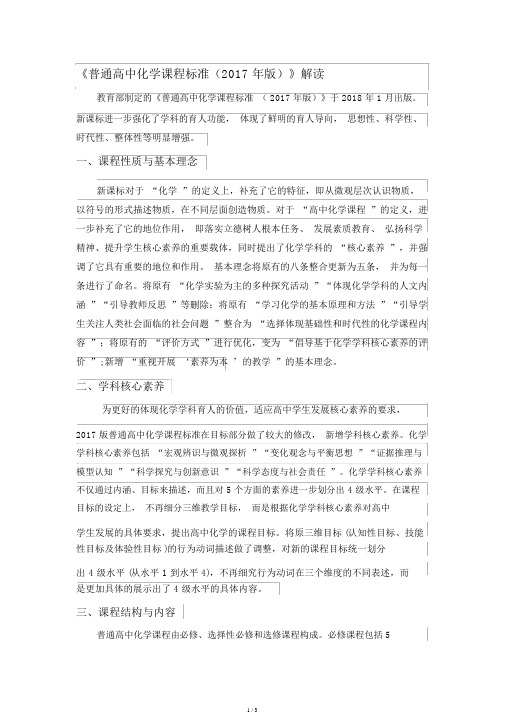
《普通高中化学课程标准(2017 年版)》解读教育部制定的《普通高中化学课程标准( 2017 年版)》于 2018 年 1 月出版。
新课标进一步强化了学科的育人功能,体现了鲜明的育人导向,思想性、科学性、时代性、整体性等明显增强。
一、课程性质与基本理念新课标对于“化学”的定义上,补充了它的特征,即从微观层次认识物质,以符号的形式描述物质,在不同层面创造物质。
对于“高中化学课程”的定义,进一步补充了它的地位作用,即落实立德树人根本任务、发展素质教育、弘扬科学精神、提升学生核心素养的重要载体,同时提出了化学学科的“核心素养”,并强调了它具有重要的地位和作用。
基本理念将原有的八条整合更新为五条,并为每一条进行了命名。
将原有“化学实验为主的多种探究活动”“体现化学学科的人文内涵”“引导教师反思”等删除;将原有“学习化学的基本原理和方法”“引导学生关注人类社会面临的社会问题”整合为“选择体现基础性和时代性的化学课程内容”;将原有的“评价方式”进行优化,变为“倡导基于化学学科核心素养的评价”;新增“重视开展‘素养为本’的教学”的基本理念。
二、学科核心素养为更好的体现化学学科育人的价值,适应高中学生发展核心素养的要求,2017 版普通高中化学课程标准在目标部分做了较大的修改,新增学科核心素养。
化学学科核心素养包括“宏观辨识与微观探析”“变化观念与平衡思想”“证据推理与模型认知”“科学探究与创新意识”“科学态度与社会责任”。
化学学科核心素养不仅通过内涵、目标来描述,而且对 5 个方面的素养进一步划分出 4 级水平。
在课程目标的设定上,不再细分三维教学目标,而是根据化学学科核心素养对高中学生发展的具体要求,提出高中化学的课程目标。
将原三维目标 (认知性目标、技能性目标及体验性目标 )的行为动词描述做了调整,对新的课程目标统一划分出4 级水平 (从水平 1 到水平 4),不再细究行为动词在三个维度的不同表述,而是更加具体的展示出了 4 级水平的具体内容。
高中化学课程标准

有机化学基础
有机化合物的组成 与结构
烃及其衍生物的性 质与应用
糖类 氨基酸和蛋白 质
有机合成高分子化 合物
探讨有机化合物的组成、结构、性质及应用,学习 有机化学研究的基本方法,了解有机化学对现代社会发展 和科技进步的贡献。
实验化学
化学实验基础
化学实验探究
通过实验探究活动,掌握基本的化学实验技能和方法, 进一步体验实验探究的基本过程,认识实验在化学科学 研究和化学学习中的重要作用,提高化学实验能力。
(2)重视通过典型的化学实验事实帮助学生认识物质及其变化的本质和规律。例如,可通 过具体实验数据引导学生讨论第三周期元素及其化合物的性质变化规律。
(3)利用化学实验史实帮助学生了解化学概念、化学原理的形成和发展,认识实验在化学 学科发展中的重要作用。
(4)引导学生综合运用所学的化学知识和技能,进行实验设计和实验操作,分析和解决与 化学有关的实际问题。
经历 感受 体验 承认 认同 欣赏 尊重 珍惜 形成 养成 具有 热爱 坚持 追求
……
常用体验性的动词表示 情感态度与价值观
12
化学课程
内容标 准
结构
化
学
选修模块
与 生
活
基础、多样、选择 综合性的课程结构
化 学 与 技 术
化 学 反 应 原 理
有 机 化 学 基 础
物 质 结 构 与 性
质
实 验 化ቤተ መጻሕፍቲ ባይዱ学
内容标 准
化学共同必修(A1、A2)
认识常见的化学物质,学习重要的化学概念,形 成基本的化学观念和科学探究能力,认识化学对人 类生活和社会发展的重要作用及其相互影响,进一 步提高学生的科学素养。学习内容主题包括“认识 化学科学”、“化学实验基础”。“常见无机物及 其应用”、“物质结构基础”、“化学反应与能 量”、“化学与可持续发展”等。
《普通高中化学课程标准(2017年版)》(WORD版)

普通高中化学课程标准(2017年版)中华人民共和国教育部制定人民教育出版社·北京·前言党的十九大明确提出:“要全面贯彻党的教育方针,落实立德树人根本任务,发展素质教育,推进教育公平,培齐德智体美全面发展的社会主义建设者和接班人。
基础教育课程承载着党的教育方针和教育思想,规定了教育目标和教育内容,是国家意志在教育领域的直接体现,在立德树人中发挥着关键作用。
2003年,教育部印发的普通高中课程方案和课程标准实验稿,指导了十余年来普通高中课程改革的实践,坚持了正确的改革方向和先进的教育理念,基本建立起适合我国国情、适应时代发展要求的普通高中课程体系,促进了教育观念的更新,推进了人才培养模式的变革,提升了教师队伍的整体水平,有效推动了考试评价制度的改革,为我国基础教育质量的提高作出了积极贡献。
但是,面对经济、科技的迅猛发展和社会生活的深刻变化,面对新时代社会主要矛盾的转化,面对新时代对提高全体国民素质和人才培养质量的新要求,面对我国高中阶段教育基本普及的新形势,普通高中课程方案和课程标准实验稿还有一些不相适应和亟待改进之处。
2013年,教育部启动了普通高中课程修订工作。
本次修订深入总结21世纪以来我国普通高中课程改革的宝贵经验,充分借鉴国际课程改革的优秀成果,努力将普通高中课程方案和课程标准修订成既符合我国实际情况,又具有国际视野的纲领性教学文件,构建具有中国特色的普通高中课程体系。
一、修订工作的指导思想和基本原则(一)指导思想以马克思列宁主义、毛泽东思想、邓小平理论、“三个代表”重要思想、科学发展观、习近平新时代中国特色社会主义思想为指导,深入贯彻党的十八大、十九大精神,全面贯彻党的教育方针,落实立德树人根本任务,发展素质教育,推进教育公平,以社会主义核心价值观统领课程改革,着力提升课程思想性、科学性、时代性、系統性、指导性,推动人才培养模式的改革创新,培养德智体美全面发展的社会主义建设者和接班人。
解读02课程性质与基本理念——2017年版《普通高中课程标准》化学解读

一、课程性质
(1)重新定义化学学科概念
2017年版2003年实验版变化
化学是在原子、分子水平上研究物质的组成、结构、性质、转化及其应用的一门基础学科,其特征是从微观层次认识物质,以符号形式描述物质,在不同层面创造物质。
化学是在原子、分子水平上研究物
质的组成、结构、性质及其应用的
一门基础自然科学,其特征是研究
分子和创造分子。
增加了物质的“转
化”,特征方面突出了
从微观层次认识物
质、以符号形式描述
物质。
(2)增加了“核心素养”这一名词,重新定位化学课程作用
2017年版2003年实验版变化
普通高中化学课程是与义务教育化学或科学课程相衔接的基础教育课程,是落实立德树人根本任务、发展素质教育、弘扬科学精神、提升学生核心素养的重要载体;化学学科核心素养是学生必备的科学素养,是学生终身学习和发展的重要基础;化学课程对于科学文化的传承和高素质人才的培养具有不可替代的作用。
普通高中化学课程是与九年义务教
育阶段《化学》或《科学》相衔接
的基础教育课程。
课程强调学生的
主体性,在保证基础的前提下为学
生提供多样的、可供选择的课程模
块,为学生未来的发展打下良好的
基础。
增加“核心素养”这一
名词,并两次提到,
强调了它具有重要的
地位和作用
二、基本理念
2017年版《普通高中化学课程标准》从03版的8条修改为现在的5条,并为每一条都进行了命名。
原创精品资源学科网独家享有版权,侵权必究!
1。
普通高中化学课程标准-2017年

普通高中化学课程标准(送审稿)教育部基础教育课程教材专家工作委员会普通高中课程标准修订组高中目录一、课程性质与基本理念 (1)(一)课程性质 (1)(二)基本理念 (1)二、学科核心素养与课程目标 (2)(一)学科核心素养 (2)(二)课程目标 (3)三、课程结构 (5)(一)设计依据 (5)(二)结构 (5)(三)学分与选课 (6)1.学分设置 (6)四、课程内容 (8)(一)必修课程 (8)(二)选修Ⅰ课程 (21)(三)选修Ⅱ课程 (41)五、学业质量标准 (51)(一)学业质量标准及说明 (51)(二)学业质量水平 (51)六、实施建议 (55)(一)教学与评价建议 (55)(二)学业水平考试命题建议 (61)(三)教材编写建议 (65)(四)地方和学校实施本课程的建议 (68)附录A:学科核心素养的水平划分 (71)附录B:教学与评价案例 (73)附录C:学生必做实验索引 (84)一、课程性质与基本理念(一)课程性质化学是在原子、分子水平上研究物质的组成、结构、性质、变化及其应用的一门基础学科,其特征是从微观层次认识物质,以符号形式描述物质,在不同层面创造物质。
化学不仅与经济发展、社会文明的关系密切,也是材料科学、生命科学、环境科学、能源科学和信息科学等现代科学技术的重要基础。
化学在促进人类文明可持续发展中发挥着日益重要的作用,是揭示元素到生命奥秘的核心力量。
普通高中化学课程是与九年义务教育《化学》或《科学》相衔接的基础教育课程,是落实“立德树人”根本任务、促进学生化学学科核心素养形成和发展的重要载体;化学学科核心素养是现代社会公民必备的科学素养,是学生终身发展的重要基础;化学课程对于科学文化的传承和高素质人才的培养具有不可替代的作用。
(二)基本理念1.以发展化学学科核心素养为主旨立足于学生适应现代生活和未来发展的需要,充分发挥化学课程的整体育人功能,构建全面发展学生化学学科核心素养的高中化学课程目标体系。
普通高中化学课程标准-2017年(完整资料).doc

此文档下载后即可编辑普通高中化学课程标准(送审稿)教育部基础教育课程教材专家工作委员会普通高中课程标准修订组2017年6月目录一、课程性质与基本理念 (1)(一)课程性质 (1)(二)基本理念 (1)二、学科核心素养与课程目标 (2)(一)学科核心素养 (2)(二)课程目标 (5)三、课程结构 (7)(一)设计依据 (7)(二)结构 (8)(三)学分与选课 (9)1.学分设置 (9)四、课程内容 (11)(一)必修课程 (11)(二)选修Ⅰ课程 (31)(三)选修Ⅱ课程 (64)五、学业质量标准 (80)(一)学业质量标准及说明 (80)(二)学业质量水平 (80)六、实施建议 (87)(一)教学与评价建议 (87)(二)学业水平考试命题建议 (98)(三)教材编写建议 (104)(四)地方和学校实施本课程的建议 (108)附录A:学科核心素养的水平划分 (113)附录B:教学与评价案例 (116)附录C:学生必做实验索引 (130)一、课程性质与基本理念(一)课程性质化学是在原子、分子水平上研究物质的组成、结构、性质、变化及其应用的一门基础学科,其特征是从微观层次认识物质,以符号形式描述物质,在不同层面创造物质。
化学不仅与经济发展、社会文明的关系密切,也是材料科学、生命科学、环境科学、能源科学和信息科学等现代科学技术的重要基础。
化学在促进人类文明可持续发展中发挥着日益重要的作用,是揭示元素到生命奥秘的核心力量。
普通高中化学课程是与九年义务教育《化学》或《科学》相衔接的基础教育课程,是落实“立德树人”根本任务、促进学生化学学科核心素养形成和发展的重要载体;化学学科核心素养是现代社会公民必备的科学素养,是学生终身发展的重要基础;化学课程对于科学文化的传承和高素质人才的培养具有不可替代的作用。
(二)基本理念1.以发展化学学科核心素养为主旨立足于学生适应现代生活和未来发展的需要,充分发挥化学课程的整体育人功能,构建全面发展学生化学学科核心素养的高中化学课程目标体系。
普通高中化学课程标准
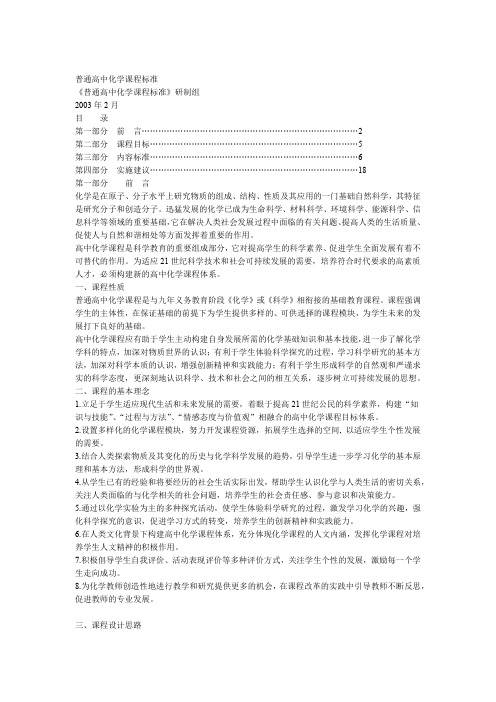
普通高中化学课程标准《普通高中化学课程标准》研制组2003年2月目录第一部分前言 (2)第二部分课程目标 (5)第三部分内容标准 (6)第四部分实施建议 (18)第一部分前言化学是在原子、分子水平上研究物质的组成、结构、性质及其应用的一门基础自然科学,其特征是研究分子和创造分子。
迅猛发展的化学已成为生命科学、材料科学、环境科学、能源科学、信息科学等领域的重要基础,它在解决人类社会发展过程中面临的有关问题、提高人类的生活质量、促使人与自然和谐相处等方面发挥着重要的作用。
高中化学课程是科学教育的重要组成部分,它对提高学生的科学素养、促进学生全面发展有着不可替代的作用。
为适应21世纪科学技术和社会可持续发展的需要,培养符合时代要求的高素质人才,必须构建新的高中化学课程体系。
一、课程性质普通高中化学课程是与九年义务教育阶段《化学》或《科学》相衔接的基础教育课程。
课程强调学生的主体性,在保证基础的前提下为学生提供多样的、可供选择的课程模块,为学生未来的发展打下良好的基础。
高中化学课程应有助于学生主动构建自身发展所需的化学基础知识和基本技能,进一步了解化学学科的特点,加深对物质世界的认识;有利于学生体验科学探究的过程,学习科学研究的基本方法,加深对科学本质的认识,增强创新精神和实践能力;有利于学生形成科学的自然观和严谨求实的科学态度,更深刻地认识科学、技术和社会之间的相互关系,逐步树立可持续发展的思想。
二、课程的基本理念1.立足于学生适应现代生活和未来发展的需要,着眼于提高21世纪公民的科学素养,构建“知识与技能”、“过程与方法”、“情感态度与价值观”相融合的高中化学课程目标体系。
2.设置多样化的化学课程模块,努力开发课程资源,拓展学生选择的空间, 以适应学生个性发展的需要。
3.结合人类探索物质及其变化的历史与化学科学发展的趋势,引导学生进一步学习化学的基本原理和基本方法,形成科学的世界观。
4.从学生已有的经验和将要经历的社会生活实际出发,帮助学生认识化学与人类生活的密切关系,关注人类面临的与化学相关的社会问题,培养学生的社会责任感、参与意识和决策能力。
《普通高中化学课程标准》(2017年版)
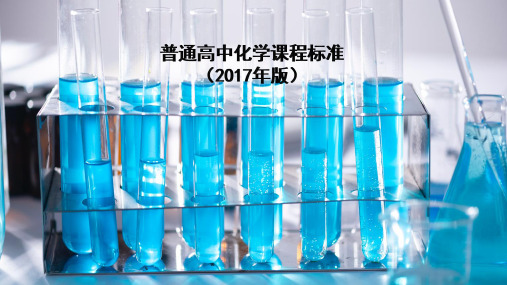
模块2 物质 结构与性质
模块3 有机 化学基础
系列1
• 实验化学
系列2
• 化学与社会
系列3
• 发展中的化 学科学
五、学业质量
学业质量 是什么?
是学生在完成本 科课程学习后的 学业成就表现!
共划分为4个 层次!
六、实施建议
• 领会化学学科核心素养内涵——制定化学教学目标; • 把握学业质量标准——选择和组织化学教学内容; • 精心设计实验探究活动; • 创设学习情境——促进学习方式转变; • 实施“教、学、评”一体化,有效开展化学日常学习评价; • 增进化学学课理解,提升课堂教学能力
4. 养成独立思考,敢于质疑和勇于创新的精神。
5. 能较深刻理解化学、技术、社会和环境之间的相互关系。
三、课程结构
• 依据普通高中课程方案,满足学生发展的多元需求,设计必修、 选修和选择性必修课程
• 借鉴国内外课程研究成果、反映课程实施的现实需要,设计课程 组织形式
• 基于化学学科特点及核心素养内涵,确定课程主题、模块和系列
七、附录
附录1 化学学科核心素养的水平划分 附录2 学生必做实验
二、学科核心素养与课程目标
宏观辨识与 微观探析
变化观念与 平衡思想
科学探究与 创新意识
证据推理与 模型认知
1. 掌握物质的分类方法;运用符号表示物质及其变化;形成“结 构决定性质,性质决定应用的观念。”
2. 认识物质的变化是有条件的;能全面分析物质的化学变化;能 预测可能发生的化学变化。
3. 提出假设,分析推理。
一、课程性质与基本理念 二、学科核心素养与课程目标 三、课程结构 四、课程内容 五、学业质量 六、实施建议 化学是一门基础学科! • 从微观层面认识物质! • 以符号形式描述物质! • 在不同层面创造物质! • 是现代科学技术的重要基础!
普通高中化学课程标准(必修部分)
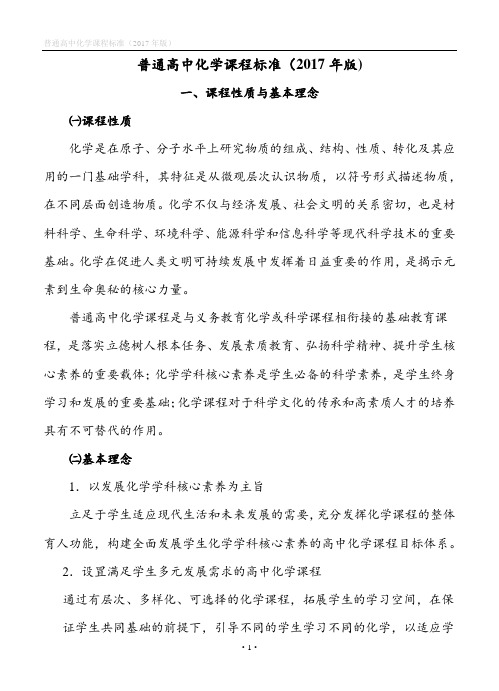
普通高中化学课程标准(2017年版)一、课程性质与基本理念㈠课程性质化学是在原子、分子水平上研究物质的组成、结构、性质、转化及其应用的一门基础学科,其特征是从微观层次认识物质,以符号形式描述物质,在不同层面创造物质。
化学不仅与经济发展、社会文明的关系密切,也是材料科学、生命科学、环境科学、能源科学和信息科学等现代科学技术的重要基础。
化学在促进人类文明可持续发展中发挥着日益重要的作用,是揭示元素到生命奥秘的核心力量。
普通高中化学课程是与义务教育化学或科学课程相衔接的基础教育课程,是落实立德树人根本任务、发展素质教育、弘扬科学精神、提升学生核心素养的重要载体;化学学科核心素养是学生必备的科学素养,是学生终身学习和发展的重要基础;化学课程对于科学文化的传承和高素质人才的培养具有不可替代的作用。
㈡基本理念1.以发展化学学科核心素养为主旨立足于学生适应现代生活和未来发展的需要,充分发挥化学课程的整体育人功能,构建全面发展学生化学学科核心素养的高中化学课程目标体系。
2.设罝满足学生多元发展需求的高中化学课程通过有层次、多样化、可选择的化学课程,拓展学生的学习空间,在保证学生共同基础的前提下,引导不同的学生学习不同的化学,以适应学生未来发展的多样化需求。
3.选择体现基础性和时代性的化学课程内容结合人类探索物质及其变化的历史与化学科学发展的趋势,引导学生进一步学习化学的基本原理和方法,形成化学学科的核心观念;结合学生已有的经验和将要经历的社会生活实际,引导学生关注人类面临的与化学有关的社会问题,培养学生的社会责任感、参与意识和决策能力。
4.重视开展“素养为本”的教学倡导真实问题情境的创设,开展以化学实验为主的多种探究活动,重视教学内容的结构化设计,激发学生学习化学的兴趣,促进学生学习方式的转变,培养他们的创新精神和实践能力。
5.倡导基于化学学科核心素养的评价依据化学学业质量标准,评价学生在不同学习阶段化学学科核心素养的达成情况,积极倡导“教、学、评”一体化,促进每个学生化学学科核心素养得到不同程度的发展。
普通高中化学课程标准

《普通高中化学课程标准(2017年版)》解读教育部制定的《普通高中化学课程标准(2017年版)》于2018年1月出版。
新课标进一步强化了学科的育人功能,体现了鲜明的育人导向,思想性、科学性、时代性、整体性等明显增强。
一、课程性质与基本理念新课标对于“化学”的定义上,补充了它的特征,即从微观层次认识物质,以符号的形式描述物质,在不同层面创造物质。
对于“高中化学课程”的定义,进一步补充了它的地位作用,即落实立德树人根本任务、发展素质教育、弘扬科学精神、提升学生核心素养的重要载体,同时提出了化学学科的“核心素养”,并强调了它具有重要的地位和作用。
基本理念将原有的八条整合更新为五条,并为每一条进行了命名。
将原有“化学实验为主的多种探究活动”“体现化学学科的人文内涵”“引导教师反思”等删除;将原有“学习化学的基本原理和方法”“引导学生关注人类社会面临的社会问题”整合为“选择体现基础性和时代性的化学课程内容”;将原有的“评价方式”进行优化,变为“倡导基于化学学科核心素养的评价”;新增“重视开展‘素养为本’的教学”的基本理念。
二、学科核心素养为更好的体现化学学科育人的价值,适应高中学生发展核心素养的要求,2017版普通高中化学课程标准在目标部分做了较大的修改,新增学科核心素养。
化学学科核心素养包括“宏观辨识与微观探析”“变化观念与平衡思想”“证据推理与模型认知”“科学探究与创新意识”“科学态度与社会责任”。
化学学科核心素养不仅通过内涵、目标来描述,而且对5个方面的素养进一步划分出4级水平。
在课程目标的设定上,不再细分三维教学目标,而是根据化学学科核心素养对高中学生发展的具体要求,提出高中化学的课程目标。
将原三维目标(认知性目标、技能性目标及体验性目标)的行为动词描述做了调整,对新的课程目标统一划分出4级水平(从水平1到水平4),不再细究行为动词在三个维度的不同表述,而是更加具体的展示出了4级水平的具体内容。
三、课程结构与内容普通高中化学课程由必修、选择性必修和选修课程构成。
- 1、下载文档前请自行甄别文档内容的完整性,平台不提供额外的编辑、内容补充、找答案等附加服务。
- 2、"仅部分预览"的文档,不可在线预览部分如存在完整性等问题,可反馈申请退款(可完整预览的文档不适用该条件!)。
- 3、如文档侵犯您的权益,请联系客服反馈,我们会尽快为您处理(人工客服工作时间:9:00-18:30)。
普通高中化学课程标准课程的基本理念(The basic idea of chemistry curriculum standard course in Senior High School)The basic idea of chemistry curriculum standard course in Senior High School1. based on the students to adapt to modern life and future development, focus on improving the scientific literacy of citizens in twenty-first Century, the construction of "knowledge and skills", "process and method", "emotional attitude and values" integration of the chemistry curriculum goal system.2., set up diversified chemistry curriculum modules, and strive to develop curriculum resources, expand the space for students to choose, to meet the needs of students' personality development.3., combined with the history of human exploration of material and its changes and the development trend of modern chemical science, to guide students to further study the basic ideas and basic methods of chemistry, and to form a scientific world outlook.4. students from the existing experience and will experience the social reality of life, closely related to help students understand the chemistry and human life, concerned with the chemical related social problems facing humanity, cultivating students' sense of social responsibility, sense of participation and decision-making ability.5. through a variety of research activities based on chemistry experiments, so that students can experience the process of scientific research, to stimulate interest in learning chemistry, strengthen the scientific research consciousness, promote the transformation of learning, to cultivate students' innovative spirit and practical ability in practice.6., under the background of human culture, construct chemistry curriculum system, understand the humanistic connotation of chemistry curriculum, and play the important role of chemistry curriculum in cultivating students' Humanistic spirit.7., actively promote students' self-evaluation, performance evaluation and other evaluation methods, pay attention to the development of students' personality, encourage every student to succeed.8., it provides a new platform for chemistry teachers to creatively carry out teaching and research". In the practice of curriculum reform, teachers should be guided to reflect and promote the professional development of teachers.Understanding the basic concepts of Compulsory Education Chemistry CourseThe basic concept of Compulsory Education Chemistry course:Let every student with a relaxed and happy mood to understand chemistry colorful and closely linked with human beings, and actively explore the mysteries of chemical change, a sustained interest in learning chemistry, enhance self-confidence tolearn chemistry.For each student to provide equal learning opportunities, so that they can adapt to the chemical knowledge, skills, methods and attitudes necessary for modern life and the future of society, to adapt to the necessary for future survival and development of scientific literacy, but also pay attention to the students of different levels can get good development on the basis of the original.Starting from the existing experience of students, let them feel the importance of chemistry in the familiar scenes of life, understand the close relationship between chemistry and life, gradually learn to analyze and solve some simple problems related to chemistry.Let the students have more chances to experience the process of knowledge, in the process of formation and practice to develop a scientific attitude, scientific method, and gradually form the consciousness and ability of lifelong learning in the "science" into practice.Enable the students to understand the chemical contribution to the development of human civilization, understanding of chemistry in the realization of harmonious coexistence between man and nature, to promote the status and role of human and social sustainable development, for the realization of chemical believe that a better future for human beings will continue to play a major role in it.To provide diversified learning evaluation methods for eachstudent's development. It not only examines the degree of students' knowledge and skills, but also pays attention to the evaluation of students' scientific inquiry ability and practical ability, and also pays attention to the development of students' emotion, attitude and values. In the process of learning, strive to make more students learn to reflect and self-evaluation.-- from the "Full-time Compulsory Education Chemistry Curriculum Standards"Middle school chemistry curriculum idea:Pay attention to the needs of students' lifelong development and improve their scientific literacy.Chemistry curriculum should be based on students' development. On the basis of cultivating students' basic academic ability, we should pay attention to the cultivation of students' development ability and creative ability, so that students can adapt to social life and sustainable development. Therefore, the chemistry course should guide the students to understand the scientific process and understand the scientific methods,To understand the relationship between science, technology and society, to understand the relationship between man and nature, to study scientific thought, to develop scientific spirit and to form a scientific statePay attention to the needs of students' personality development and provide optional courses.To all the students, respect and develop students' personality, respect for the needs of different students, facing the differences of students, in a variety of ways to increase optional courses, for each student to provide equal, choice of learning opportunities, to meet the various needs of students' development.Pay attention to the needs of students to adapt to the development of the times, select the content of the course.Pay attention to the existing experience of students, starting from the actual life of students familiar with, let students feel the close relationship between chemistry and daily life, and further understand the social problems related to chemistry, so that they apply what they have learned. Chemistry curriculum should overcome the closure of the traditional course, pay attention to the new development, reflect the characteristics of modern chemistry chemical science; internal relations with other disciplines of chemistry, humanistic spirit; pay attention to occupation orientation of chemistry education.Pay attention to students' learning process, and advocate diverse learning methods.We should take the students as the main body, improve the structure of students' learning activities, and let the students develop vividly and actively. Should pay attention to the development process of chemical science, let the students know how to obtain scientific knowledge, learning to participate in scientific practice, the acquisition andapplication of chemical knowledge; to strengthen the practice and experimental teaching, pay attention to practice, to cultivate students' practical ability. By changing the teaching methods and learning methods, increase students' feelings and experience of scientific inquiry and other activities.Pay attention to students' learning performance and develop diversified evaluation methods.To pay attention to the development of law and the physical and psychological characteristics of the students, provide the opportunity to participate in the whole process of teaching for all students and the environment, enable the students to participate in their own strengths to feel the teaching experience, as long as their commitment, and cooperate with others, there will be new discoveries and new improvement, it is possible to succeed and to share the joy of success with others. To evaluate as an important part of learning, we should strengthen the incentive mechanism of teaching evaluation, and create a comprehensive and diversified learning evaluation corresponding to curriculum objectives and learning activities.Excerpt from "Shanghai middle school chemistry curriculum standard"The ideal of education is for all people,Whether it's urban or rural,Rich and poor, clever or stupid;The ideal of education is for all of man, whether moral or personality,Physiological or psychological, intellectual or emotional?.-- from the education of ideals and ideals of EducationAuthor: unknown article source: Chemistry studio click number: 1711 update time: 2007-1-15[instructions]The basic idea of curriculum is the understanding of curriculum, which embodies the value orientation of curriculum, the cultural view of curriculum and the design concept of curriculum. The national compulsory education curriculum concept mainly includes five aspects, namely "for all students", "the comprehensive development of students" and "outstanding students" differences "and" improve scientific literacy "and" advocating inquiry learning". Among them, "for all students" is the concrete manifestation of "curriculum value orientation" all-round development; "the all-round development of students", "outstanding student difference" is the basic requirement of quality education; "advocating inquiry learning" is the most important content and ideas in chemistry curriculum standards "to improve the scientific literacy; is the ultimate goal of chemical education. The internal logic of the above five aspects of the relationship is: for all students is the basis; to change the way of learning,advocating inquiry learning, improve scientific literacy is the goal; focus on the all-round development and lifelong development and personality development is essential. Students' overall development, lifelong development and personality development should be the foothold of curriculum.First, the new curriculum emphasizes "facing the students"""Student oriented" contains four layers of meaning:One is to emphasize the all-round improvement of all aspects of students' quality.The two is to emphasize the "whole" students, so that most students can meet the requirements, success.Three is to emphasize the promotion of each student's "personality" development.The four is the design of curriculum teaching to meet the students' psychological and development characteristics, pay attention to and care for the needs of students, interest, pursuit, experience, experience, feeling, confusion, difficulties and so on.These ideas can only be implemented through the full implementation of teachers in practice.Two, the new curriculum emphasizes "improving students' scientific literacy.""The so-called scientific literacy, simply speaking, is citizens' understanding of science.In the 2061 plan of the American Association for the advancement of Science in 1986, scientific literacy was defined as "having and using the knowledge of science, mathematics and technology to make important decisions about individuals and society."."Scientific literacy is a general goal of science education. It has different requirements for students according to different levels of school education. In teaching practice, it is important for students to find what they learn is interesting, so that they will continue to learn science knowledge formally or informally in the future. In the national curriculum standards of chemistry, and did not make the definition of the connotation of scientific literacy is very clear, just from the curriculum goal perspective into knowledge and skill, process and method, emotion attitude and values of the three aspects, through the three aspects of cultivating the scientific literacy of the civil society in the future.In order to cultivate students' scientific literacy in chemical curriculum reform, is to guide teachers and students to change the traditional tendency of paying too much attention to imparting knowledge and skills, emphasizing the scientific process and methods, pay attention to emotional attitude and value education, to enable students to obtain the process of chemical knowledge and skills become the understanding of chemical, scientific research, social contact the real life and the formation process of scientific values. Some of the scientific literacy can not be covered or can not be fullytested by the examination methods such as paper and pencil test. If teachers only pay attention to the quality of examination in the aspects concerned, it is bound to make all aspects of the quality of students all-round, balanced, harmonious development, the pursuit of this course eventually failed.Three, the new curriculum stipulates that all students should meet the basic requirementsThe new curriculum to make strict control of the learning contents of total, cut a large number of today's social life is rarely used or theory is too strong, too difficult for most students the content of the new curriculum content decreased in quantity and difficulty, to reduce the burden of the students, promote students to the most academic success.Therefore, teachers should pay attention to understand the intention of reform, in the face of the whole class students teaching, do not arbitrarily cut off the content to pick up again, do not easily put down the difficulty raised again. There are still some experimentation area during the experiment unsatisfactory, as some teachers spirit to the new curriculum understanding is not deep, always feel uncomfortable, not enough knowledge to speak, not in place, and in the course of teaching in an effort to complement and expand and deepen, it will again increase the students' the burden of learning, the new curriculum has entered another misunderstanding.Four, the new curriculum strengthens the selectivity, pays attention to the student individualityThe curriculum reform in the curriculum for each student's personality left a lot of space, not only reduce the required courses, elective courses to increase the proportion of class, comprehensive practical activities such as learning time, providing students with free elective content still required courses (such as reading materials). For selective learning content, teachers should respect students' decisions and give necessary guidance. Therefore, teachers should pay attention to correctly handle the study content, be good at teaching students according to the specific situation of stratification.The new curriculum does not over emphasize the rigor of the logic system and the concepts and laws of the discipline itself. Therefore, teachers should not blindly pursue finished speaking through a pole in the end. Teaching should pay attention to content and core concept focused on the new curriculum, and for some of the key concepts, such as acid, alkali, salt, valence etc.,The teaching material uses the easy to understand description, lets the student through the concrete example to understand.Five, the new curriculum emphasizes life oriented and social orientedTeachers should pay attention to the students' existing experience and social life in teaching, make full use of the local school resources, and carry out localization teaching and school-based teaching.The new curriculum emphasizes students' daily life, contact with social reality and new progress in science and technology, such as greatly increase and strengthen ties with the social life of learning content closely in textbooks, especially those with current students living in today's society, practical, modern technology and production practice, the new problems and new situations and new problems (especially is the latest technical problems) contact learning content closely, further expand the scope of knowledge and at the macro level, expand the breadth of learning.In addition, the new curriculum emphasizes to introduce new content from the student's daily life and social practice learning, emphasizes the cultivation of students' ability to abstract and application specific problems of social life in the practical circumstances into theoretical problems of the ability to solve practical problems, which requires students in the face of the actual situation or actual problem first to determine which the problem with the knowledge learned, which can be used to solve the.。
